If you are looking to update your superfood list, then do make sure that spirulina is somewhere near the top! This blue-green algae is packed with a wide range of nutrients that can support a wide range of diets and lifestyles and at the same time, it may just help improve your heart health and boost your immunity!
In this review we take a look at ten of the best spirulina powders that you can add to your diet for a superfood boost. We also take an in-depth look at its nutritional profile and how spirulina may help promote better heart health as well as its potential role as a metabolism booster. We also discuss some of the side effects of spirulina and why it is important to ensure any spirulina powder or supplement you buy has been tested for heavy metals and toxins.Quick Comparison: Top 10 Best Spirulina Powders
1. Nutrex Hawaii Pure Hawaiian Spirulina Powder
Certified vegan and gluten free, the Nutrex Hawaii pure Hawaiian spirulina is organic and Non-GMO Project Verified. This spirulina is also kosher, halal, preservative and soy-free. Each batch of this spirulina is tested for quality and safety – including heavy metal and microbial testing. Grown in Kona, Hawaii, this is a farm to bottle product made by a company that is GMP (Good Manufacturing Practices) third party certified.
Coming as a 16 oz jar, one teaspoon of this powder should be taken daily with, or between meals. Like any supplement, there can be a risk of side effects and some have found that the odor can come through strongly, which means they end up taking less than they should.Pros
Cons
2. NOW Certified Organic Spirulina Powder
The NOW certified organic spirulina powder is quality assured by adherence to mandatory FDA Current Good Manufacturing Processes (CGMP) and other manufacturing requirements. These include product testing for quality and safety, including for heavy metals and contaminants.
As well as being USDA organic, this spirulina powder is non-GMO, kosher and halal. Some of the recent batch of this pure powder have been received with damaged seals and although this powder should be a 1 lbs. net weight, some have found its weight to be considerably less - even when weighing the plastic jar as well.Pros
Cons
3. Zhou Nutrition Non-GMO Spirulina Powder
Harvested in southeastern California through a closed-loop production system which recycles without discharging into the environment, this non-irradiated and pure Zhou spirulina comes as a 6 oz jar. This spirulina has been processed in an FDA certified facility following good manufacturing practices (GMP) and everything is tested for quality and safety; although some consumers have tried to access certificates of analysis to confirm test results and have been unable to do so.
This non-GMO spirulina powder is also free from herbicides and pesticides. Some have received this powder with damage to its inner seal and this damage also increases the risk of the powder leaking during shipping.Pros
Cons
4. Micro Ingredients Pure Organic Spirulina Powder
The 1 lbs. pack of pure Microingredients organic spirulina is certified USDA organic and free from any GMO ingredients. This non-irradiated powder is currently sourced from Taiwan and some buyers have found this has a particularly strong odor and taste.
This powder also comes in a resealable bag with a scoop, but it can be more awkward to extract the powder from this type of package. There is currently no information as to what this product is tested for although some previous buyers were able to access test results.Pros
Cons
5. BulkSupplements Spirulina Powder
This 8.8 oz pack of BulkSupplements spirulina powder is a pure powder produced in China and was tested for heavy metal contamination and the certificate of analysis has been made available to previous buyers. It now seems to be sourced from California but whether this is now harvested there or just packaged, there is still uncertainty. Buyers can request the certificate of analysis for their batch through the manufacturer’s website though. This powder comes as a resealable pack rather than a jar and it can be difficult to reseal after opening.
Pros
Cons
6. Sari Foods Co Organic Spirulina Powder
The non-GMO and certified USDA organic Sari Foods Company spirulina powder was sourced from freshwater lakes in a remote area of Mongolia, but current packaging states it is sourced from Korea and third party tested for quality and safety in the US. It is also packaged in a GMP facility in the US. Certificates of analysis can be requested from the manufacturer.
Some consumers have noted that a recent batch of this pure 1 lbs. powder has been particularly pungent and as a pack rather than a jar, this can be more awkward to measure the powder out of.Pros
Cons
7. Soul Organics Spirulina Powder
The Soul Organics spirulina is certified as organic by four certification bodies including the USDA and it is free from GMO ingredients. This 8 oz pack of pure powder is tank farmed in southern India and independently tested by multiple bodies.
Some buyers have not been as happy with the taste of this compared to other spirulina powders and because this comes in a resealable pack instead of a jar you will probably have to transfer it into another container before trying to scoop it out.Pros
Cons
8. BN Labs Spirulina Powder Organic
The BN organic spirulina powder is responsibly sourced, free from GMO ingredients and certified USDA organic. This 8 oz resealable pack of pure spirulina powder is harvested in Mongolia and although tested by the manufacturer for heavy metal contamination, it is not tested independently.
Pros
Cons
9. Earthrise Spirulina Natural Powder
The 6.4 oz jar of Earthrise spirulina natural has been grown in California and the farm is subject to FDA and State of California inspections. It also adheres to quality standards. This spirulina is free from pesticides and herbicides and the manufacturer testing checks for these as well as toxins and heavy metals.
This powder is manufactured by one of the few continental US companies producing spirulina with Generally Recognized As Safe or GRAS status. The odd buyer has commented that this powder can be more prone to clumping and it will cost more than other brands of spirulina powder.
Pros
Cons
10. Vimergy USA Grown Spirulina
Harvested in the US, the Vimergy spirulina dietary supplement is Non-GMO Project Verified and certified kosher. Produced without pesticides or herbicides, this 8.8 oz pack of pure spirulina powder also has GRAS or Generally Recognized As Safe status. It is also independently tested for quality and safety. As a premium spirulina powder this will cost more than other powders and as this comes in a resealable pack rather than jar it can be more difficult to extract the powder from and seal again after use.
Pros
Cons
Things to Consider Before Buying Spirulina Powder
Rich in protein, vitamins, minerals and specific antioxidants, spirulina is a food source in some parts of Africa where it is made into dry cakes. It is also consumed in Mexico and even back in the time of the Aztecs, spirulina was harvested was food.
Spirulina is a cyanobacterium or blue-green algae which grows in subtropical salt and fresh-water in conditions which are considered extreme to other water-dwelling organisms. It is often cultivated in natural or man-made lakes, harvested and then freeze-dried.
There are various species collectively known as spirulina, but the main ones used as supplements include Spirulina maxima and Spirulina platensis.
It is commercially produced for use as an additive or color in some foods and of course, supplements. Spirulina was once a categorized as a plant but as scientists discovered more about its genes, biochemistry and physiology, it was moved to the Bacteria kingdom and the Cyanobacteria phylum. Spirulina grows as microscopic spirals which are easy to harvest as they usually stick together, and it is a protein complex called phycocyanin which gives spirulina its distinctive blue-green color.
High in protein and rich in vitamins, spirulina also contains minerals such as zinc, magnesium and selenium and some of these vitamins and minerals are able to act as antioxidants in the body to help prevent damage caused by molecules called free radicals.
How to Use Spirulina
As spirulina does have a sea vegetable flavor and savory tang, it can be off putting in some foods and drinks. If you add it to a smoothie with sweet fruits such as mango or pineapple the spirulina is able to offset the sweetness and the edge is taken off some of the stronger flavor of the spirulina. It can also be stirred into pineapple or other sweet fruit juices. Try adding it to energy balls, baking it into cookies or adding it to salad dressings. You could also add two teaspoons alongside an avocado and spices for homemade guacamole.
A small spoonful of spirulina powder can also be stirred into a glass of water and then consumed – be prepared for the water to change to an almost black color though and do keep a fresh glass of water to hand to drink straight after to help prevent tooth staining.
Brushing your teeth thoroughly after consuming spirulina powder will also help prevent tooth staining occurring over time. Tooth staining only occurs with spirulina powder, not with tablets or capsules.
Spirulina Safety
Spirulina is generally safe, and few side effects have been reported from those using it at recommended doses.
The United States Pharmacopeia (USP) states that ‘the available evidence does not indicate a serious risk to health or other public health concern when spirulina is properly identified, formulated, and used.’
Most people can consume spirulina without any side effects, but minor side effects can include headaches, insomnia and nausea. However, spirulina may not be suitable for people who have specific health conditions.
The immune-boosting properties of spirulina is one reason as to why it is so popular, however for those who have autoimmune disorders such as rheumatoid arthritis, lupus or multiple sclerosis, spirulina can actually make these conditions worse. It has also been linked with a very rare side effect in which a severe autoimmune response affects skin and muscle. Anyone with an autoimmune disorder should not take spirulina, or indeed any other type of algae supplements.
Spirulina can contain phenylalanine and this amino acid should be avoided by anyone who suffers with the metabolic disorder phenylketonuria (PKU) as the body is unable to metabolize phenylalanine.
Spirulina is able to act as an anticoagulant, thinning the blood and increasing the length of time it takes to clot. If you have a bleeding disorder or take blood thinners, then spirulina can reduce the ability of your blood to clot which will cause more bleeding and bruising.
Like anything, it is possible to have an allergic reaction to spirulina and in rare cases the reaction could be fatal. It has been suggested that those who have existing allergies may be more likely to have an allergic reaction to spirulina and so should check with their healthcare provider before consuming it.
Heavy Metal and Toxin Contamination of Spirulina
Spirulina which has been harvested from the wild has a higher risk of being contaminated with heavy metals, bacteria or microcystins, which are molecules produced by blue-green algae as a defense against predators. Unfortunately, microcystins can be toxic to our livers if consumed in high quantities.
Some supplements contaminated with microcystin have been found in the US, Italy and China, which does mean that wild spirulina has some public health concerns. Spirulina which is ‘farmed’ or grown in controlled environments contains lower amounts of microcystins as scientists can limit its production as well as remove it from the spirulina.
Like other types of supplement though, the FDA do not regulate spirulina, so unless the manufacturer undertakes their own testing and makes the results available, there is no guarantee that the spirulina you buy will be free from contaminants. Many supplement manufacturers are reputable and do publish their results, usually in the form of a certificate of analysis.
Many manufacturers also follow good manufacturing principles or GMP and adhere to other manufacturing practices to help ensure a better quality and safer product.
A small number of US spirulina powder manufacturers may also have Generally Recognized As Safe or GRAS status. This means that a chemical or substance added to food (food additive) is considered to be safe by experts which makes it exempt from the tolerance requirements of the Federal Food, Drug and Cosmetic Act (FFDCA). For GRAS status to be achieved, a manufacturer has to show that there is expert agreement that the substance or additive is safe for the intended use.
Nutritional Value and Metabolic Benefits of Spirulina
One of the reasons that spirulina is so popular as a supplement is due to its nutritional profile. One tablespoon of dried spirulina contains around 20 calories and the following:
Protein | 4 grams |
Carbs | 1.67 grams |
Fat | 0.54 grams |
Potassium | 95 milligrams |
Sodium | 73 milligrams |
Magnesium | 14 milligrams |
Phosphorus | 8 milligrams |
Iron | 2 milligrams |
It also contains vitamin A, various Bs, C and K.
Spirulina can help boost weight management programs as it is so nutrient rich and in a 2016 study, overweight participants who ate spirulina for three months improved their BMI or body mass index. It may also help with weight loss by boosting metabolism. One small study showed that taking 6 grams of spirulina a day was able to boost metabolism alongside weight loss in people with non-alcoholic fatty liver disease.
One animal study showed that mice with type 1 diabetes who were given spirulina had lower blood sugar levels, higher insulin levels and improved enzyme markers in their livers. Supplementing with spirulina has also been shown to lower fasting blood glucose levels which means that spirulina may be helpful as a support food for type 2 diabetics.
Possible Role for Spirulina in Supporting Better Heart Health
Spirulina has been shown to reduce blood pressure in a small group of people who had hypertension (high blood pressure) and were overweight. It may also help to reduce overall cholesterol levels as one review of other research showed that spirulina was able to significantly reduce total levels of cholesterol as well as LDL or ‘bad’ cholesterol and at the same time increase the amount of ‘good’ or HDL cholesterol. Just one gram of spirulina a day was able to reduce total cholesterol after three months.
As hypertension and higher cholesterol levels are linked to an increased risk of heart disease, it seems that there is a possibility that spirulina could help reduce our risk of heart disease. As research into the benefits of spirulina is still in its early days, it would be some time before more is known about its effects; but early results do seem positive.
Other Possible Benefits of Spirulina Supplementation
When the inner nose begins to swell as part of an allergic reaction to pollens, pests or dust this is known as allergic rhinitis. Spirulina may help improve the sneezing, nasal congestion, runny nose and other symptoms of allergic rhinitis as well as reduce levels of histamine (which causes the allergic response) in the body.
As spirulina is a source of tryptophan, an amino acid which supports the production of serotonin in the brain, it may help support mental wellbeing. People with conditions such as anxiety or depression often have lower levels of serotonin so tryptophan may help boost serotonin levels and alleviate symptoms.
Spirulina may also be able to support the health of our gut by preserving healthy gut bacteria during aging, although this may be more supportive when consumed as part of a high fiber diet rich in healthy gut foods.
There may also be a role for spirulina as an antitoxic agent which could combat pollutants such as lead, mercury, arsenic, fluoride and iron in the body. This means spirulina could be useful as a therapeutic agent alongside conventional treatments for these types of poisonings.
Conclusion
We hope you have enjoyed our in-depth review of a range of pure spirulina powders currently available. We also hope you enjoyed reading about spirulina nutrition, how early medical research is showing some positive and promising future uses for spirulina, as well as the safety aspects that you should be aware of when selecting and supplementing with spirulina powder.
If you have yet to add this superfood to your diet, we trust you now feel confident to not only choose the best spirulina powder for your diet and lifestyle, but also the easiest way to add it to your daily diet.
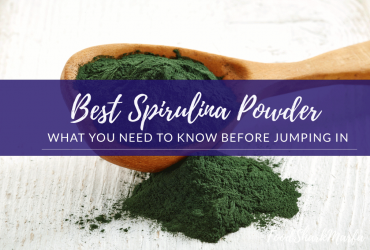
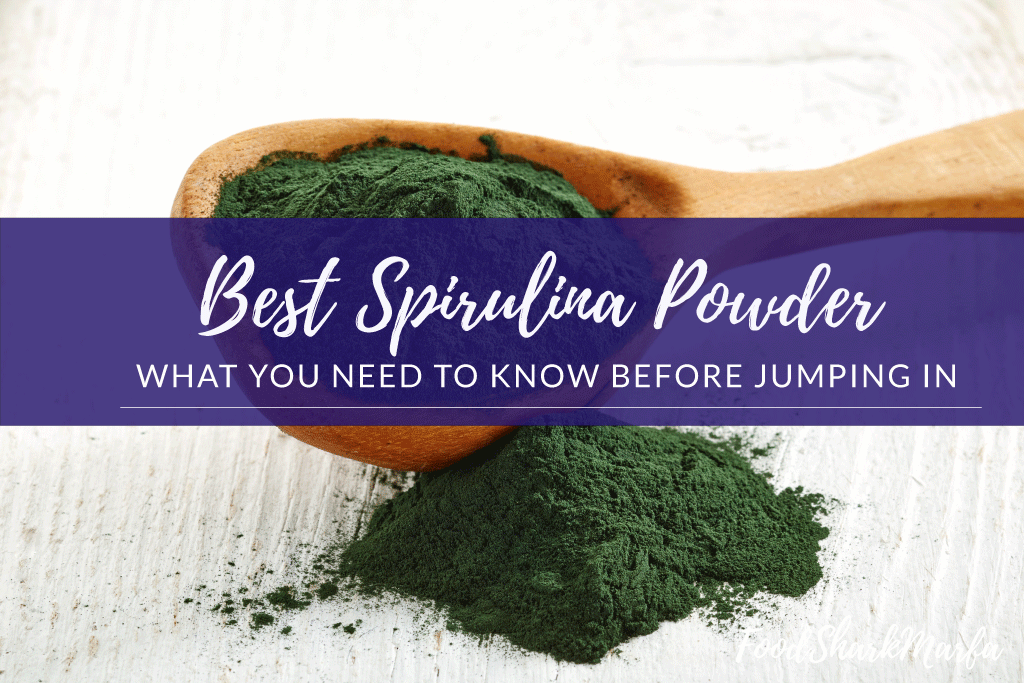
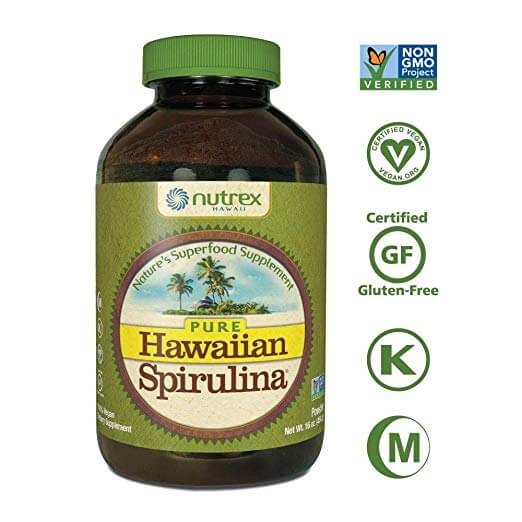
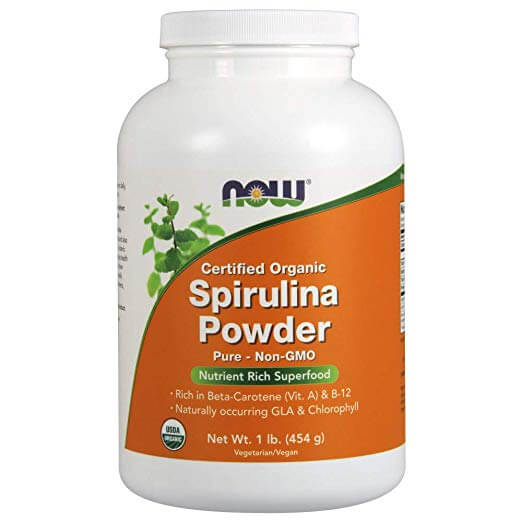
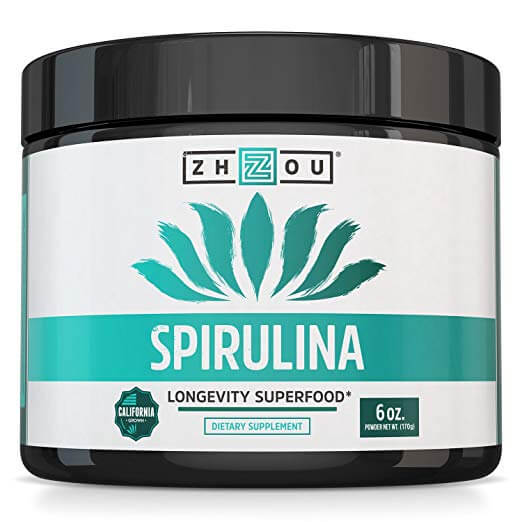
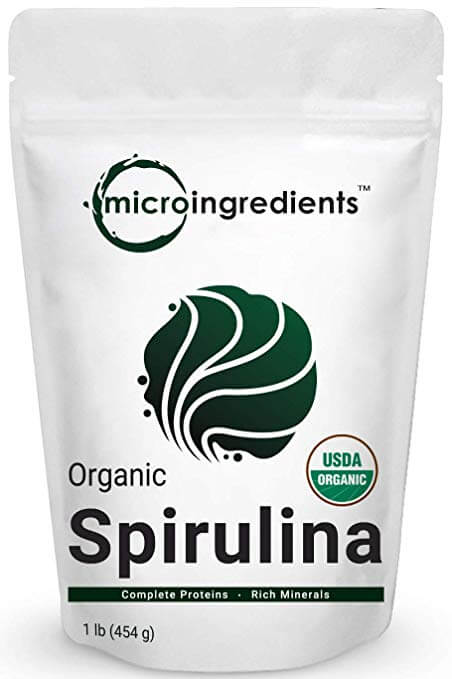
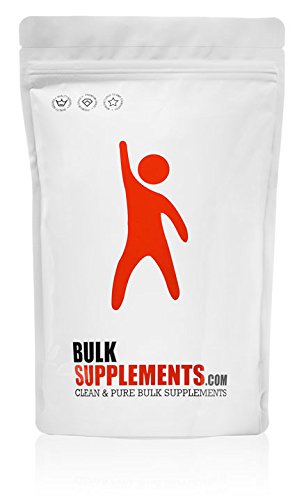

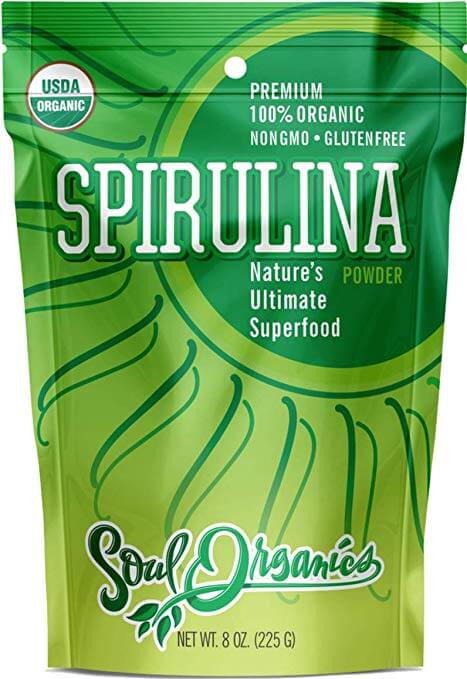
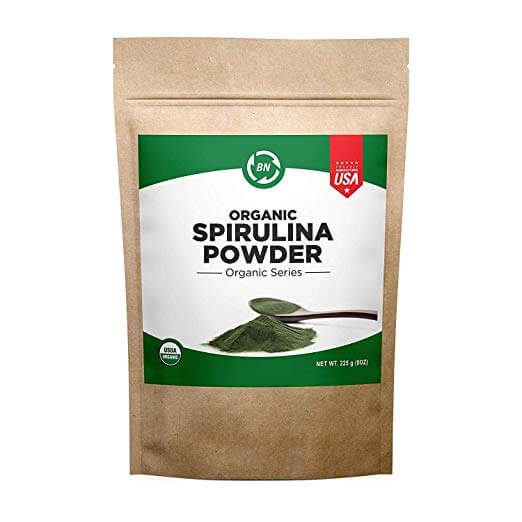
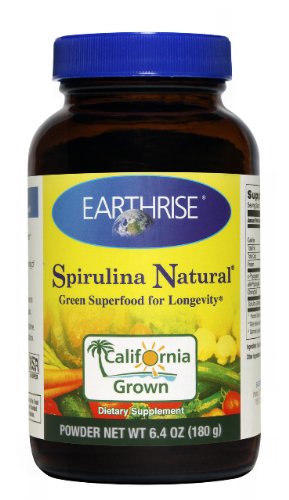
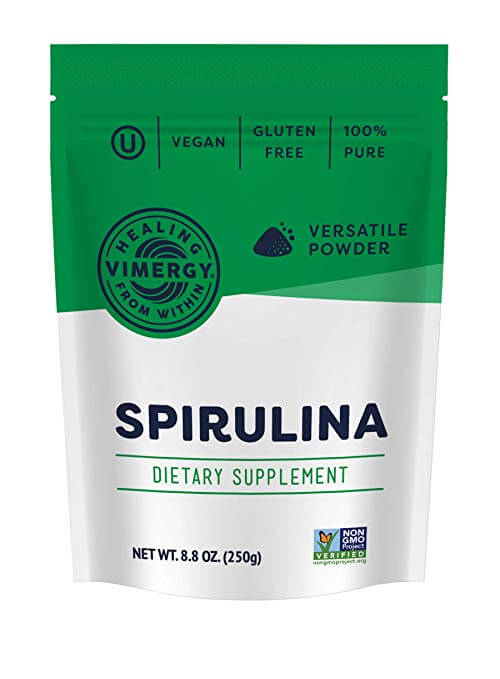

How much spirulina caused the muscle,skin disease?